You may have never heard of Stanley Whitaker. Not so in the world of progressive rock, where he and his outrageous talent on guitar has earned the admiration of thousands of prog rock fans, as well as the respect of prog icon Peter Gabriel, who wanted Stanley to be part of his back-up band. He’s that good.
Stan’s band, Happy The Man, and their music still have fans around the world, though the band hasn’t been together for almost a decade. The highs and lows of Stan’s existence have given him an experientially wealthy perspective on life. His highs came from making the music he loved and the thunderous applause from appreciative audiences. The serious lows kicked in when Stan learned he had a rare form of cancer.
Triumph and Disaster. What makes Stanley’s story so affecting is how he faced them…
ATI: First things first. Tell me about your parents and your relationships with them, and, I’m just curious, was religion a big part of your family life?
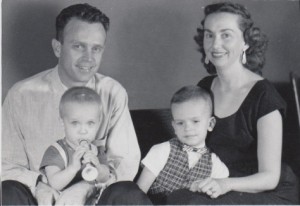 STAN: No. Religion was not a big part of our family life. I have vivid remembrances of going to Sunday school and some of that, but we never went to church past that. I don’t know if it was because we moved around a lot—each tour of duty was a 1-1/2 to 2 years. The stint in Germany was three years but that doesn’t happen too often. It was usually a 2-year stint, and then you moved somewhere else.
STAN: No. Religion was not a big part of our family life. I have vivid remembrances of going to Sunday school and some of that, but we never went to church past that. I don’t know if it was because we moved around a lot—each tour of duty was a 1-1/2 to 2 years. The stint in Germany was three years but that doesn’t happen too often. It was usually a 2-year stint, and then you moved somewhere else.
ATI: Because you were an Army brat.
STAN: Yes. Both my parents were from Missouri. They were from farmer families, and my Dad joined the Army very young, went through all the ranks and ended up a full colonel in the Army. He served in three wars (WWII, Korea and Viet Nam) and had a very strict upbringing. Pretty typical for a lifer in the Army, as they called the veterans there, but it was good. They filled me with good, “Leave It to Beaver,” type morality, and that was probably my favorite show when I was a kid was, “Leave It to Beaver” and “The Andy Griffith Show,” too. I adored those shows. There was something charming about them—something just charming about that era–they instilled their own morality, and that’s pretty much what I grew up with.
ATI: Did you have difficulty making friends, or were you afraid to make friends because you knew you would be gone?
STAN: It was hard to make friends, because you knew you’d make them, and then you’d move somewhere else; partly because of that, I developed a really bad stutter. Whenever I would be in a brand-new school, and they’d have me stand up in front of the class, I’d get stuck on my middle initial, which is E, and I have vivid memories of “Stanley E. E. E.” I would get caught on the E. I put it to the fact that I was somewhere different. I was very uncomfortable—I had to make new friends every 1-1/2 to 2 years, and I was very shy.
ATI: How long did the stutter stay with you? Did you have to take any kind of speech therapy or anything?
STAN: It lasted until I moved to Germany and, around 11th grade, it pretty much had stopped. Basically, my brain was going faster than my mouth was able to keep up with, so I just learned to slow the thoughts down a little bit and think about what I was saying, and then I didn’t have as much trouble with it. Every once in a while I’ll still get stuck on something. But, it was a big deal all the way through 11th grade.
ATI: You were born on June 27th, 1954 in Monett, Missouri. Was there an Army base in Monett, Missouri?
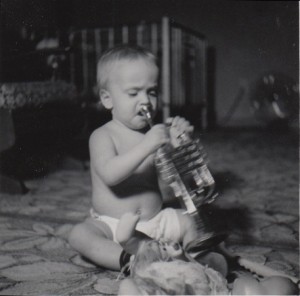 STAN: There is an Army base real near there. Both my parents’ families were from that area—Monett and Joplin. Joplin’s the place that got hammered by all the hurricanes (2011). That’s where my father was from, so I was actually grateful that he wasn’t alive to see that devastation when it happened. That’s where they were from, and they would go back there to visit. They probably just went back there to visit family, because my remembrances are more Army bases throughout the state of Virginia and in Germany.
STAN: There is an Army base real near there. Both my parents’ families were from that area—Monett and Joplin. Joplin’s the place that got hammered by all the hurricanes (2011). That’s where my father was from, so I was actually grateful that he wasn’t alive to see that devastation when it happened. That’s where they were from, and they would go back there to visit. They probably just went back there to visit family, because my remembrances are more Army bases throughout the state of Virginia and in Germany.
ATI: How do you think your good fortune (at least, to us) to be able to experience life in other cultures like Spain and Germany affected you and the way you grew up?
STAN: A whole lot. Spain wasn’t as earth-shaking as Germany, but the two years in Spain, I was 8 and 9 years old. Spain was actually kind of scary to me; I remember there weren’t too many Americans over there at all, and the Spanish kids were not very nice to us, and I remember having rocks and dirt clods thrown at us.
The two years we lived in Spain were not really very pleasant, but my Dad was good about taking us around all the sights, and we’d go visit southern Spain and Valencia and Segovia. He was a real historian kind of a guy, so that was a really cool thing about him as a Pop. When we were kids we thought we were being dragged to a lot of these places, but now I have a much greater appreciation for all the places he took us, especially when we lived in Germany. That was from ’69 to ‘72. Living in Germany for three years was probably the most evolutionary time of my whole life. That particular tour of duty was absolutely life-changing
ATI: Did you learn how to speak Spanish and German?
STAN: A little bit of Spanish, but not a lot. It was required in the little American school we attended, and in Germany, it was the same thing. You had to take German, and I seemed to be much more adaptable to German than I was to Spanish, so I did speak German pretty fluently while I lived over there. It was a good time to be there, because the music there was so different than what was over here. To hear bands like Yes and King Crimson in 1969—it was very revolutionary for that time. And I probably wouldn’t have been exposed to that genre of Progressive music if I had not been over there or, at least, I would not have been exposed to it for 2-5 more years if I had stayed in the states. I just remember concerts being really cheap in Germany, and we would go see bands just because they had a cool name. That’s how we got exposed to Vander Graff Generator and Gentle Giant and a lot of those Progressive bands that aren’t as popular as Yes and Emerson, Lake and Palmer and King Crimson. I got to see the very first Emerson, Lake and Palmer concert ever, their very first performance. They showed up with Keith Emerson and walls and racks of synthesizers and stuff; it took them three hours to set up all his insane, early synthesizer stuff while the crowd is out there. They were three hours late, but they came up and said, “This is our first ever show.” I got to see a lot of monumental events over there—Pink Floyd with full choir and orchestra—stuff that just didn’t make it over here, unfortunately.
ATI: And, at the time, your relationship with your parents was good?
STAN: It was good, but it was also strained, because my Dad wasn’t around a lot. My Mom was, so she raised us much more so than he. We mostly saw him on the weekends or late at night. He was the one that brought my first guitar home when I was 8 years old, and he was the one a few years later that would say, “God, you are always playing that damn guitar. You know you can’t be a musician.” And my mother would say, “Well wait, you know the kid’s got a little bit of talent here. Let him play the guitar.” She always stood up for me and my brother on the music and art side of life. My father later resented bringing the guitar home, because it was “damn hippie musicians” and that whole scene. He didn’t quite realize what he had brought home and started.
ATI: You spoke about your brother Ken. What type of relationship did you have with him growing up?
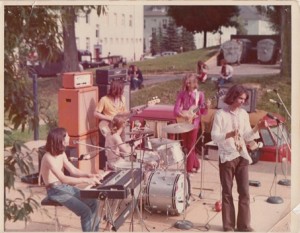 STAN: Ken and I were really close. He was two years older than I and, in a lot of ways, he was my mentor musically and artistically. He was quite an artist even though he didn’t get much support for that from my parents. He was a very unique, very original artist, and I really looked up to him. He was always on top of all the best new Prog bands. He just had to pull from what was hip and what was new coming out, especially while we lived in Europe. Yeah, we had a good relationship. He played the bass and sang a little bit. The final summer we lived in Germany, the summer of 72, I graduated. Ken had graduated two years before me, but we got to travel to all the Army bases. There were 48 of them throughout all of Germany, and he joined the band (Editor’s Note: Shady Grove—more on this later) because my Dad was actually [sent back to the US] and my parents felt a little better about me staying over there with my older brother there to watch over me. So we got to tour all these bases the whole summer, and that was a wonderful, magical time, too. He would stand on stage and sing and, while he was singing, he would paint pictures.
STAN: Ken and I were really close. He was two years older than I and, in a lot of ways, he was my mentor musically and artistically. He was quite an artist even though he didn’t get much support for that from my parents. He was a very unique, very original artist, and I really looked up to him. He was always on top of all the best new Prog bands. He just had to pull from what was hip and what was new coming out, especially while we lived in Europe. Yeah, we had a good relationship. He played the bass and sang a little bit. The final summer we lived in Germany, the summer of 72, I graduated. Ken had graduated two years before me, but we got to travel to all the Army bases. There were 48 of them throughout all of Germany, and he joined the band (Editor’s Note: Shady Grove—more on this later) because my Dad was actually [sent back to the US] and my parents felt a little better about me staying over there with my older brother there to watch over me. So we got to tour all these bases the whole summer, and that was a wonderful, magical time, too. He would stand on stage and sing and, while he was singing, he would paint pictures.
ATI: Why did he do that?
STAN: He was just a really strange, eclectic fellow; it was nothing we ever talked about. One night, he brought an easel onstage and, while he sang, he doodled on this thing. It was just him being an eclectic arty guy, and we let him do it.
ATI: Wow. Describe your introduction to music. When did you first even notice?
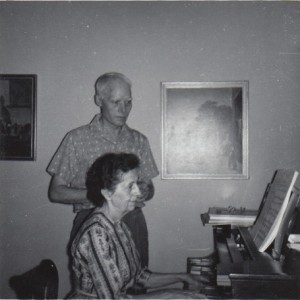 STAN: I had a great-aunt named Fannie Mae. Fannie Mae Henbest lived in Washington, D.C. and was married to a wonderful man named Lloyd. Lloyd was an archaeologist/geologist kind of guy. He was always interesting and had all kinds of wonderful stories and slide shows of his most recent visits to Africa or wherever. He was a curator at the Smithsonian during the fifties and would take the whole family around for private tours. He also worked for National Geographic. He was a really cool guy and his wife, Fannie Mae, was a wonderful classical pianist. I remember going to their little apartment in Georgetown; they had two huge turn-of-the-century, nine-foot Steinway grand pianos side by side in one room, and I would always wonder how they got those pianos in there. They told us they had them put in when the building was being built during the 30’s or 40’s, so the pianos were “flown” in through the side of the building. It didn’t make sense to me, but they were real interesting.
STAN: I had a great-aunt named Fannie Mae. Fannie Mae Henbest lived in Washington, D.C. and was married to a wonderful man named Lloyd. Lloyd was an archaeologist/geologist kind of guy. He was always interesting and had all kinds of wonderful stories and slide shows of his most recent visits to Africa or wherever. He was a curator at the Smithsonian during the fifties and would take the whole family around for private tours. He also worked for National Geographic. He was a really cool guy and his wife, Fannie Mae, was a wonderful classical pianist. I remember going to their little apartment in Georgetown; they had two huge turn-of-the-century, nine-foot Steinway grand pianos side by side in one room, and I would always wonder how they got those pianos in there. They told us they had them put in when the building was being built during the 30’s or 40’s, so the pianos were “flown” in through the side of the building. It didn’t make sense to me, but they were real interesting.
She was a brilliant pianist and would set me on her lap or next to her on her little stool and play classical music. That was my first true love of music and why, to this day, I just adore classical music. Especially Debussy. He’s my all-time-favorite composer in the whole world, and she was the first to play his music for me. For the first five years of my life, we would visit them a lot, because we were usually stationed somewhere in the state of Virginia. We would drive the few hours up to D.C. and visit them; it was always a delightful mix of music and archaeology.
They were wonderful. She even actually played for a couple of presidents when they would hold dinner parties, and she was John Kennedy’s pianist for his short reign, and 2 or 3 president’s before Kennedy. I don’t know if it was Truman or Roosevelt or another president, but she was his on-staff pianist.
ATI: You were also into puppets around this time. What was it about puppets that intrigued you?
STAN: I don’t really know what first intrigued me with the puppets. I think as a little kid I remember seeing something I think was called Thunderbolt It was a really horribly done, almost sci-fi themed, rocket puppetry thing, but it was marionettes. I remember seeing that as a little kid and being fascinated with the string puppets, and it was like, wow, what the heck is that? And so we bought a few string puppets, and I just fell in love with them, and I had a few hand puppets. The marionettes were made by a British company called Pelham Puppets, and the hand puppets came from a German company called Steiff, which is famous for teddy bears. For me, it was a good escape. I didn’t really like talking; I knew I stuttered and was a shy kid, so using the puppets was another way for me to express myself. It has always been a fascination for me. Then, when my Dad brought the guitar home when I was 8 or 9 years old, I found a new love of those strings over the marionette strings. The puppets went to the wayside.
ATI: But you’re still into puppets. You and your wife, LeeAnne, are working on a project together.
STAN: LeeAnne and I have formed a company called Mother Nurture Fairy Tales, and our intent is to do some wonderful little 3-5-minute fairy tales with a wonderful, good old, “Leave It to Beaver”/Andy Griffith-kind of morality to it, but with some “Fractured Fairy Tales”-type of humor thrown in. One of my favorite cartoons as a kid was Rocky and Bullwinkle. Man, they were brilliant, because they really were written way above what we as kids were able to grasp; there was some very intelligent writing for that show—even musically. I think the music on that show is some of the coolest music ever from that whole period. Our intent is to do these wonderful little fairy tales with cool music, cool messages, do the whole production here at our house, put them out on You Tube and just have fun with it. Hopefully, it will be a viable product so we can make a living.
ATI: Let’s go back to your first guitar. You’ve said it made your Dad crazy later, so why do you think he brought it in the first place?
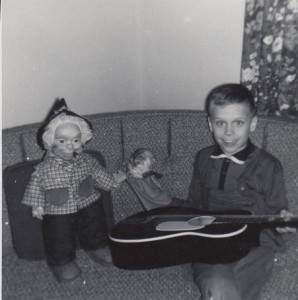 STAN: I don’t know. I think it was because we were in Spain and because the Spanish guitar is big over there. He was probably at the PX (the Army post exchange), and they had a cheap guitar there. For whatever whim, he just got it. It wasn’t something that I had expressed any interest in. For him to do something like that was monumental. He never brought stuff home, never unless it was a baseball or a football or something, so this was way out of character for him. It was a Stella acoustic guitar, and I remember the strings being a good half-inch off of the neck, ridiculously hard to play, but as soon as I picked it up, I just fell in love with it. I think it was a three-quarter-size guitar. It wasn’t a full size, but I’ve got pictures of me as a kid sitting on the couch with this little guitar and my puppets on either side of me. So it’s interesting—these are the loves of my life as a 4 and 5 year old.
STAN: I don’t know. I think it was because we were in Spain and because the Spanish guitar is big over there. He was probably at the PX (the Army post exchange), and they had a cheap guitar there. For whatever whim, he just got it. It wasn’t something that I had expressed any interest in. For him to do something like that was monumental. He never brought stuff home, never unless it was a baseball or a football or something, so this was way out of character for him. It was a Stella acoustic guitar, and I remember the strings being a good half-inch off of the neck, ridiculously hard to play, but as soon as I picked it up, I just fell in love with it. I think it was a three-quarter-size guitar. It wasn’t a full size, but I’ve got pictures of me as a kid sitting on the couch with this little guitar and my puppets on either side of me. So it’s interesting—these are the loves of my life as a 4 and 5 year old.
ATI: Nothing like first love!
STAN: That got me introduced to and in love with the guitar, but I didn’t play it long before it was “Dad, Mom, this thing is really hard to play.” When we moved back to the states from Spain, I was 10 or 11 years old, and they bought me my first real guitar, which was a Goya Range Master; it was a really bizarre electric guitar that had all these weird split pick-ups and tons of buttons and knobs, but it was wonderful for me to learn on–much easier to play. I went through two years of guitar lessons with that guitar. A few years later, I bought a Gibson Les Paul, which was what I had been dreaming of and striving towards. The Goya went by the wayside, until an old friend said, “Man, I’ll buy it, because I don’t have a guitar.” I sold it to him and didn’t even think twice about it. The blessing is that he showed up some 40 years later at one of my shows down in northern Virginia, and said, “Hey, man, I brought your guitar back to give it to you.” I was floored. I now have back my original Goya Range Master.
ATI: Great story! So, were you a quick study at the guitar as a student?
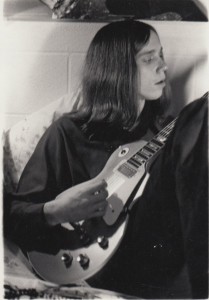 STAN: Yeah, I was. I had a really good ear, or so I was told, and so I felt also. I went through this whole Mel Bay modern guitar method. It’s a 7-book course. It’s supposed to be a 3-5-year course, and I went through the whole series in two years. My teacher was quite astonished and realized that I was a cut above his normal student, and he told my parents that, too. So I had good support. They brought me to my lesson every week, and it was later that I think that my Dad really regretted it—“Oh, damn he is going to be a fucking rock musician.” He shouldn’t have brought that first guitar home,
STAN: Yeah, I was. I had a really good ear, or so I was told, and so I felt also. I went through this whole Mel Bay modern guitar method. It’s a 7-book course. It’s supposed to be a 3-5-year course, and I went through the whole series in two years. My teacher was quite astonished and realized that I was a cut above his normal student, and he told my parents that, too. So I had good support. They brought me to my lesson every week, and it was later that I think that my Dad really regretted it—“Oh, damn he is going to be a fucking rock musician.” He shouldn’t have brought that first guitar home, 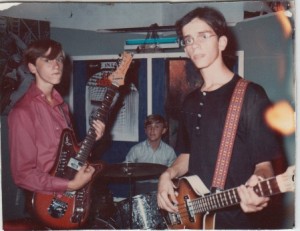 because as soon as I heard Jimi Hendrix in 1967, I was, like, “Okay, this is definitely what I want to do!” He was the first guitar player to really turn my head around to where “Oh, man! Okay! Gee! This is what I want to do!”
because as soon as I heard Jimi Hendrix in 1967, I was, like, “Okay, this is definitely what I want to do!” He was the first guitar player to really turn my head around to where “Oh, man! Okay! Gee! This is what I want to do!”
ATI: How did you feel when you played the guitar?
STAN: For me it was meditation. I could just practice for hours on end–and I did. I would practice 3-4 hours every day, really regimented. Some of it was just practicing scales, but a lot of it was letting the guitar sort of play me, and that was that was how I learned it and loved it.
ATI: Tell me about The Impostors and the talent contest?
STAN: That was my and my brother’s first little rock band. I was 11 or just turning 12, and we did a song called, “Little Black Egg.” It was one of my favorite songs. I don’t even remember hearing it much on the radio, but that was one of the songs I distinctly remember playing. There was a local talent show in some school auditorium, and our band won the talent show. The announcer saw the little blurb about the band, told the crowd the guitar player is only 12 years old, and the place went crazy. I was up there just smiling and, “Holy crap!” I thought, “I can do this!” It was my first little rock band and my first taste of people clapping for me, and I loved what I was doing.
ATI: What did you win?
STAN: I think we won some little plaque in a frame. It was nothing major, that’s for sure; oh, and the adoration of our schoolmates.
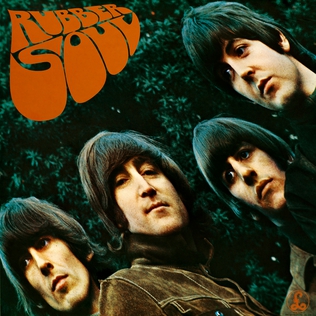 ATI: Okay. We’re huge Beatles fans around here. Tell us about the influence the Beatles had on you.
ATI: Okay. We’re huge Beatles fans around here. Tell us about the influence the Beatles had on you.
STAN: I didn’t like the early stages of the Beatles as much as from Rubber Soul on. I remember, as a kid, I was always having arguments with little girls and other people who just gushed. “Oh, the Beatles! I Want To Hold Your Hand!” I hated that era of the Beatles for whatever reason. As soon as Rubber Soul came out, which I think was in ’65, I went right out and bought it. Actually, the first album I ever bought was the Byrds’ Fifth Dimension—the one which had “8 Miles High” on it. That’s the first record I remember actually going out and physically buying. I think Rubber Soul would have been the second record I was ever allowed to go out and buy. To me, that record had transcended all the previous Beatles stuff to where I don’t know if they had started smoking pot or what. I think it probably coincided with them waking up consciously, because, to me, that was such a monumental jump from the record before that to Rubber Soul. To me, the Beatles were the first Progressive rock band, and I’ve had lots of fun discussions with other Proggers about that. “The Beatles? What are you talking about?” Well, to me, Progressive rock is and means, literally, music that can Progress and evolve from record to record, and the Beatles did that. What other band can you look at from record to record that had such monumental growth and evolution? And George Martin [the Beatles’ record producer] was a huge part of that for them. From Rubber Soul on, I believed they were the greatest band on the planet and absolutely my biggest inspiration and influence in all of music.
ATI: We concur. What did you have in mind when you began developing your own guitar technique? It must have been pretty intense.
STAN: Besides Jimi Hendrix, probably the first really Prog guy that I loved was Robert Fripp in King Crimson and also Steve Howe from Yes. I made a real point of actually learning every little lick that Steve Howe played; he was probably who I was emulating most at that point—somewhere between him and Jimi, which is an interesting spectrum. I wanted to do stuff that was along the lines of what Yes was doing, and then I heard Gentle Giant. Gentle Giant was, and still is, my all-time favorite Prog rock group. I think they were the most talented and gifted Progressive rock band on the planet and, unfortunately, did not get near the notoriety as Yes and Genesis and others.
Genesis was the other band that I saw early on. I saw them on the Trespass tour (1970), with a very young Peter Gabriel, when he was doing all the costume changes and all the really elaborate stuff. That was all tied into that Germany—a period of three years where I was seeing all those bands live, and that was the music that I wanted to emulate—a hybrid of Yes, Gentle Giant, King Crimson, Genesis, Vander Graff Generator. Those were the bands that really spoke to me the most. Jethro Tull took Gentle Giant under their wing and did many, many years of tours with them as their opening band, because they really loved them, too, and were trying to get them much more exposure. Gentle Giant was the band that probably had the most influence on me, writing-wise. I wanted to write music like Gentle Giant wrote, because of the instrumental passages more so than the vocal passages. Somewhere in between was the classical music stuff, the impressionistic, Debussy, Ravel, Stravinsky; to me, those composers were Progressive rock composers, and they go way before the Beatles as far as the first true Progressive composers. These guys were writing stuff that, if you did it with a rock band, would absolutely be called Progressive rock. I always have an interesting discussion with the Proggers about that one, too. The dichotomy for me was, in the same breath, loving all this heavy Prog stuff. I’d also go to see bands like Free and Humble Pie when I lived in Germany, and I adored Paul Rogers [Free, Bad Company]. I thought he and Steve Marriott from Humble Pie were two of the best rock ‘n’ roll singers on the freaking planet. And early Deep Purple! I got to see them with Ian Gillan. During that whole era, I loved edgy rock stuff, too, so I would clash with some of the Proggers about that as well.
“How can you like Free and Humble Pie!?” And I was, like, “What? Are you kidding? This is great ball-busting rock and roll! How can you not like this?”
“Well it’s not Prog.”
“So fucking what if it’s not Prog? It’s good music. It moves me, and that’s it. So end of discussion.”
ATI: Like most of us. back then, you got into the hippie culture. Where did you smoke your first joint?
STAN: That would have been Germany. We moved there the summer of ’69, which would have been the start of my 10th year of high school. We lived in a little town called Oberursel, Germany, on an Army base called Camp King, which was about 20 miles outside of Frankfort. My dad was the Commander of that post. I think he was a Lieutenant Colonel then, or maybe he was a full Colonel by then. We had been there only one or two days, and on my second day there, I was walking around the post, and a couple of GI’s said, “Hey, man, you want to hear some Led Zeppelin?” I was, like, “Led Zeppelin? What is that? I never heard them.” GI: “This album just came out, man. We just got it. Why don’t you come in and check it out?” First they pulled out the record (the first Led Zepplin album!), put the record on, and then found out I was the post Commander’s kid, and they were, like, “Oh really? Okay. You want to get high?”, and I was, like, “Yeah, what is that?” So, in the background, there’s the first Led Zeppelin album playing, and they break out a bowl of hash. I had never smoked pot or had anything at all to do with drugs. This was my first encounter with hashish, and, yeah, it was a monumental earth-changing evening to get stoned for the first time with these guys, who were getting a kick out of it because I was the post Commander’s kid, and they were turning me onto drugs and Led Zeppelin all in one fell swoop. That was my wake up call to Germany, drugs and some good, hard-rock music.
ATI: Well, let’s talk a while about Germany and high school. How did that experience influence your life?
STAN: I would say having the opportunity to go to high school over there was a gift, a wonderful gift, because I was living in and learning a different culture. I had the good fortune to hear and know the people, see the museums and see all the really cool architecture. I loved doing that, but on top of that, I attended Frankfurt American High School; they had a handful of serious college professors who had been at universities in the states and were fed up with the Vietnam War. These guys were basically radical college profs who got tired of the states and said “Fuck it. We’re moving to Germany to teach over there.” A teacher named Mr. Minette was my biggest mentor in high school.
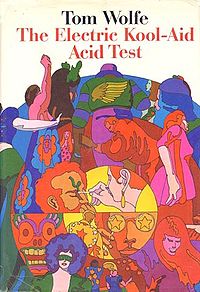 From 10th grade on, these guys were turning me onto the coolest books to read. I remember, on the first day of class, Mr. Minette handed out The Electric Kool-Aid Acid Test by Tom Wolfe—the first book I read in 10th grade in 1969. I never heard of these guys. It looked like fun. Over the next three years, we read everything by Kierkegaard, Camus—every existential writer. These guys were just out there, and they were subversive, and I loved them. To me, they were brilliant. You’ll love this. I think I was in 11th grade for this test given by Mr. Minette. Final test of the year, and the essay question is “Who is the greatest rock band in the world?” It had absolutely nothing to do with our year of English and reading study, but that was the final essay question. Mr. Minette was a huge Rolling Stones fan, so if you didn’t answer the Rolling Stones, you basically flunked the test. I and another friend, Tony Brown, were in Minette’s advanced class, and we always had wonderful back-and-forth with this guy. He loved it because we were both smart and would have some intelligent discussions with him. We answered with the Beatles. I went into a three-or-four-page dissertation as to why the Beatles just absolutely blew the Rolling Stones off of the face of the earth when it came to being the greatest rock band. It was a brilliant little essay, and he gave me and my friend Tony both an A+ on the test.
From 10th grade on, these guys were turning me onto the coolest books to read. I remember, on the first day of class, Mr. Minette handed out The Electric Kool-Aid Acid Test by Tom Wolfe—the first book I read in 10th grade in 1969. I never heard of these guys. It looked like fun. Over the next three years, we read everything by Kierkegaard, Camus—every existential writer. These guys were just out there, and they were subversive, and I loved them. To me, they were brilliant. You’ll love this. I think I was in 11th grade for this test given by Mr. Minette. Final test of the year, and the essay question is “Who is the greatest rock band in the world?” It had absolutely nothing to do with our year of English and reading study, but that was the final essay question. Mr. Minette was a huge Rolling Stones fan, so if you didn’t answer the Rolling Stones, you basically flunked the test. I and another friend, Tony Brown, were in Minette’s advanced class, and we always had wonderful back-and-forth with this guy. He loved it because we were both smart and would have some intelligent discussions with him. We answered with the Beatles. I went into a three-or-four-page dissertation as to why the Beatles just absolutely blew the Rolling Stones off of the face of the earth when it came to being the greatest rock band. It was a brilliant little essay, and he gave me and my friend Tony both an A+ on the test.
There was a really cool mutual respect, and these were heavyweight college professors who weren’t used to teaching kids that didn’t have the ability to have their roots shaken. Mr. Minette liked to shake people by their roots; and he was a bit abrasive and a bit abusive. I remember kids getting destroyed by him and crying and leaving the room in tears. “What are you, an idiot?” He didn’t pull punches, yet there was something that I admired about him even though he was a bit abusive. They were my mentors, and they woke me up to all types of religion and philosophy and stuff that I never would have got at any other high school in the US. That’s for sure.
ATI: So what is your philosophy of life now that you’ve had a chance to live?
STAN: It’s a mish-mash of a lot of stuff but I’m universal. I believe in a force called God, and I believe that there’s a flow in the Universe, and that you interact with that flow however you choose to. I believe that life is a gift, be nice and be good, and there are lot of Jesus’ teachings that I take into account. I think we are all children of God. We all have to and should be in touch with that part, and that part is innately within all of us. I believe it’s a place of purity and of good, and I try to live in that place as much as I can. If there are forces and people around me that are not of that same ilk, I simply remove myself or those people from the equation. Life is short, especially at this stage of my life, so I live with a good heart and with good intent and hope to be treated the same way.
ATI: Sounds good to me. Okay. Switching gears. Ulysses was actually your second band after The Imposters. How long were you with Ulysses?
STAN: Ulysses was 10th grade in high school, and 11th grade was another band, Shady Grove. Ulysses was my first band in high school, and I still keep in touch with some of those same guys. Some of them are still around in the D.C. area. That was a real fun band, because we did some of our own songs. It was really my first experience with writing some of our own music, and we wrote pseudo-Progressive stuff. We played a lot of Jethro Tull, and it was a very artsy Proggy band.
ATI: Let’s talk about the music you wrote and any lyrics that you wrote. What inspired you?
STAN: Lyrics, unfortunately, were not my strong suit. My brother was great with lyrics so, at that point in time, there was usually other people tasked with writing lyrics. I was responsible for writing music. I was always really good and quick at writing music. That was a natural gift and, even to this day, writing lyrics is a bit of a chore for me. I do it ass-backwards. Actually, I do it the way I just discovered Paul Simon writes a lot of his songs, which floored me. I think he’s a wonderful song writer and lyricist, and he writes the same way I do, which is to write all the music first. I even write the melodies of what I think the vocals should sound like, and then I fit words to the melodies. It’s an ass-backwards way of writing lyrics. I don’t recommend it to most songwriters. If you have the ability, write your lyrics first and then put the music to the lyrics. Lyric-writing has never been my gift. My wife can write some really good lyrics. She and I are working on some of our own music. When I do write lyrics, I attempt to tap into something of the spiritual realm and beliefs that we chatted about earlier. I figure, if you’re going to say something with lyrics, you might as well say something that’s going to touch somebody and hopefully help them grow in some way.
ATI: Absolutely. So here we are at your first tour. What was it like? Was it everything you dreamed it would be?
STAN: Yes and no. We did a lot of college tours with Happy The Man, and those were a lot of fun. For whatever reason in that period of time, there were a lot of very receptive colleges and college audiences, so we got to do a lot of wonderful shows in that regard. Arista Records would line us up little short stints. We did an 8-10-day tour with Hot Tuna, which was not a good mix musically. I remember those guys actually coming backstage to us on a few of the shows and saying, “Well it’s pretty ratty out there guys. You might not want to go out tonight. You’ll still get paid, but how about you just not even go out?” That happened on at least two of those dates.
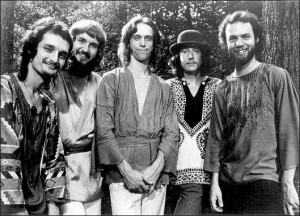 I remember at the Commack, Long Island Arena, in front of 10,000 people, we went out and got through maybe forty-five seconds of our first song before the whole crowd was chanting “Hot Fucking Tuna” at the top of their lungs and throwing beer bottles and shit up on the stage. And we’re saying, “Oh my God, okay, they don’t like Prog rock here.” That was one big farce of a tour. Some of them were in much smaller places and some of those were actually pretty good. We would get through three or four or five or six songs, but it wasn’t a fun thing. Then we got a little leg on the first Foreigner tour ever. It was a much better match-up musically, but I think we only did three or four dates with them, and that was pretty cool. We did a lot of one-off shows in a lot of theaters. We opened for Renaissance, Stomu Yamashta and The Go Band—anything that was a regional East Coast thing with Progressive rock-type of band. We lucked into a lot of cool shows that way. But those were all just one offs. We never did any bona fide, two-or-three-month tours. Never had that opportunity.
I remember at the Commack, Long Island Arena, in front of 10,000 people, we went out and got through maybe forty-five seconds of our first song before the whole crowd was chanting “Hot Fucking Tuna” at the top of their lungs and throwing beer bottles and shit up on the stage. And we’re saying, “Oh my God, okay, they don’t like Prog rock here.” That was one big farce of a tour. Some of them were in much smaller places and some of those were actually pretty good. We would get through three or four or five or six songs, but it wasn’t a fun thing. Then we got a little leg on the first Foreigner tour ever. It was a much better match-up musically, but I think we only did three or four dates with them, and that was pretty cool. We did a lot of one-off shows in a lot of theaters. We opened for Renaissance, Stomu Yamashta and The Go Band—anything that was a regional East Coast thing with Progressive rock-type of band. We lucked into a lot of cool shows that way. But those were all just one offs. We never did any bona fide, two-or-three-month tours. Never had that opportunity.
When Happy The Man was around, everybody, including us, knew that our audience was in Europe and not over here. It was 1978 or ’79, just before the band broke up, when we got signed, and our records came out. Disco was alive and well in the United States and just kicked our ass. We didn’t stand a chance over here. It was like, “man if we could only get to Europe,” but we didn’t have the means and didn’t know at all how to do that. I think, if Happy The Man would have been able to figure out how to get to Europe, it would have drastically altered our whole career. In later years, after we re-formed, Frank and I did a lot of interviews with a lot of European magazines, and all of them—across the board—were telling us, “Man, Happy The Man, you guys are in the same breath as King Crimson and Yes and Genesis. And we were, like “What? Are you kidding?” Being the humble, little Proggers that we are, it was hard to believe we had any kind of that fan base, but apparently, we do still have quite a fan base throughout Europe. We’ll never know. We never had the opportunity to play over there.
ATI: Let’s travel back a few years from there. Tell me more about your college life at James Madison, and how it led to the birth of Happy The Man.
STAN: I graduated high school in ’72, finished that fun Army base tour, and came back to go to Madison College in Harrisonburg, Virginia. A friend of mine from the band Shady Grove, David Bach, came back with me and was to be the keyboardist for Happy The Man. We didn’t even have the name yet, but while we were touring the Army bases, we met one of the Army guys at one of the first shows we did. A guy named Rick Kennell, who had just joined the Army, had a two-year stint to do before he got out. He was a bass player, met us backstage and played a Genesis song called, “The Knife.” We were, like, “Wow! This guy knows Prog, he plays, he’s very cool, and we hit it off so well that I said, “We’re going back to the states to go to school for a year or two, but when you get out of the Army, why don’t you look us up? You’d be a perfect bass player for this project we’re putting together.” That’s how we met Rick. We came back to the states to Madison College. David Bach didn’t work out keyboard-wise within the first couple of months. Then I met a guy named Frank Wyatt in one of my music 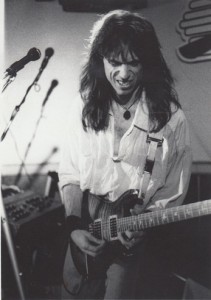 composition classes. He and I hit it off. He played sax, tenor sax and alto sax, and he had a jazz band I ended up joining. Frank was also a brilliant pianist and composer. He moved into my room, and we became roommates. We ended up rehearsing and making music in the dorm instead of being serious about school. While I was stilI in Germany, I had signed up for Madison as a music major only to find out when I got there that they don’t have a guitar major. They said I had to change my instrument, and I said, “Oh wonderful. You’re telling a music major that he has to change his instrument? Okay. I guess I’ll play violin because it’s got strings.” I made it my major even though it was a joke, because I couldn’t play violin for the life of me.
composition classes. He and I hit it off. He played sax, tenor sax and alto sax, and he had a jazz band I ended up joining. Frank was also a brilliant pianist and composer. He moved into my room, and we became roommates. We ended up rehearsing and making music in the dorm instead of being serious about school. While I was stilI in Germany, I had signed up for Madison as a music major only to find out when I got there that they don’t have a guitar major. They said I had to change my instrument, and I said, “Oh wonderful. You’re telling a music major that he has to change his instrument? Okay. I guess I’ll play violin because it’s got strings.” I made it my major even though it was a joke, because I couldn’t play violin for the life of me.
At least I got to stay there as a music major, and there was the jazz band. At least I could play the guitar with them. That’s how I met Frank, and we started Happy The Man. Rick was on leave from the army and went to get his drummer Mike Beck in Fort Wayne. The two of them came to Madison and stayed in our dorm room. We cleared all the furniture out of the dorm room and set up a whole band, rehearsed for the whole weekend and jammed. During that period we discovered this keyboard player from Harrisonburg, VA. His name was Kit Watkins, and both his parents taught piano at Madison College. To this day, I think he’s one of the greatest keyboardists on the planet. He’s a brilliant, gifted pianist—plays like nobody’s business. He had actually heard about Happy The Man, and he put up posters inviting anyone into Prog rock to come see his band—he had a little Prog group playing at the student union. He saw us come in, and he played Hoedown by Keith Emerson, played it flawlessly, and then he played some King Crimson. We were, like, “Oh, my God! Who is this guy?” Met him, fell in love with him and he became the keyboardist for Happy The Man. Kit was a real big part of the band’s sound, because we didn’t have any vocals, and the mini-Moog became the voice of the band. That’s how we all met, but we didn’t stay in school for the whole year. I think we both quit in the second semester, but still managed to live in the dorm for the rest of the year. We all took jobs around town, got a band house, where the band and the crew lived together.
ATI: Real jobs, you say? What did you do?
STAN: Oh, man. I worked in a hospital for a few years as an orderly—Rockingham Hospital in Harrisonburg. I was an orderly, and the nurses loved me. I was on the late night shift from 11 to 7 in the morning, and they would let me bring my guitar in and practice back in the orderly room. They were just wonderful. That was my main job. Before that, I was in construction, which I hated; cleaning up a Dunkin Donuts in the morning, which I hated. Frank worked at a paint store. All of us had crazy jobs, and there was a ton of work. There were a lot of factories around and a lot of chicken plants. I think Frank worked in a chicken plant. We worked at a place called Maphis Chapman, and we sucked soot all day in this factory setting for a few weeks. The orderly gig was the only thing that stuck with me—and that I stuck with. “Okay, this I can do. It’s a cool gig. I am helping people and the nurses love me. They let me bring my guitar to work, so I can practice.” I did that for 3 or 4 years.
ATI: When you were picking a different instrument at James Madison, why did you pick the violin over the piano? Wouldn’t somebody who was into Prog rock have opted for the piano?
STAN: Probably because I knew we had Frank, and we were looking for a lead-type keyboardist. I knew how to play a bunch of Beatle songs that I learned by myself, but I didn’t feel capable enough to make it a major. Part of me had always wanted to play the violin, so I thought it would be a wonderful challenge. I found a new respect for all violinists after trying to learn how to play it. It is a very tough instrument, but I still had fun learning it. I figured, if I had to go with another instrument, I would at least remain the string family.
ATI: We hear theatrics made your performances more than just a concert. How so?
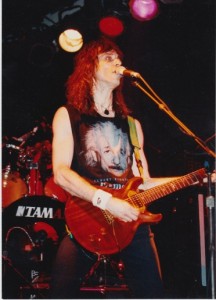 STAN: Frank had a wonderfully brilliant mind for staging and coming up with wacky stuff. We all would feed it. “Let’s have clowns jump out. Oh, yeah! Clowns! Clowns would be great!” It would fill in for our lack of vocals. We flirted with a couple of vocalists early on in Happy The Man, but they didn’t work out. We knew our musical side was much stronger, felt we should remain just music and treated it like an orchestra. It was image-evoking music so it made sense to have slide shows and movies going on, as well as theatrics with dancers coming out occasionally. We would push the envelope. We didn’t care. We were pretty fearless in our youth—that 18- to 21-year-old period—and did some very adventurous stuff. We did a dinner-theater production called, “Death’s Crown,” which was a 45-minute piece Frank had written. It was a full-blown stage production with sets and dancers all the way. Usually, when we played live, we would just have a light show behind us. We had a three-man light crew doing the light show, film, slides and everything else. We thought the images helped with the feeling we were trying to put across—sort of a full-sensory experience. We knew a lot of our audience was high.
STAN: Frank had a wonderfully brilliant mind for staging and coming up with wacky stuff. We all would feed it. “Let’s have clowns jump out. Oh, yeah! Clowns! Clowns would be great!” It would fill in for our lack of vocals. We flirted with a couple of vocalists early on in Happy The Man, but they didn’t work out. We knew our musical side was much stronger, felt we should remain just music and treated it like an orchestra. It was image-evoking music so it made sense to have slide shows and movies going on, as well as theatrics with dancers coming out occasionally. We would push the envelope. We didn’t care. We were pretty fearless in our youth—that 18- to 21-year-old period—and did some very adventurous stuff. We did a dinner-theater production called, “Death’s Crown,” which was a 45-minute piece Frank had written. It was a full-blown stage production with sets and dancers all the way. Usually, when we played live, we would just have a light show behind us. We had a three-man light crew doing the light show, film, slides and everything else. We thought the images helped with the feeling we were trying to put across—sort of a full-sensory experience. We knew a lot of our audience was high.
ATI: Let’s talk about that, because you mentioned pushing the envelope. How far beyond pot and hash did you go?
STAN: It was an experimental time, and we tried everything—everything there was. I had no interest in powders like cocaine and heroin. I flirted with cocaine a couple of times, but didn’t understand why people liked that drug. I was already so buzzy, I didn’t need to do the speed-up thing. Heroin was just a ridiculous down, so I never had any flirtations or love for that stuff. It was mostly just marijuana and hash at that point, and then a few flirtations with LSD, which was something Frank and I did explore quite freely in the early 70’s to maybe ‘75. We explored on that realm because of our spiritual upbringing and all the reading we were into. Reading The Electric Kool-Aid Acid Test in 10th-grade English awakened me to that world, and we read a lot of Carlos Castaneda. That side of life always intrigued Frank and me. We were the experimenters out of the whole band. Frank and I delved into that for maybe 2 or 3 years. We learned all we needed to learn on that drug, and it has since fallen to the wayside, which is probably good. I can’t imagine getting anywhere near that drug now.
ATI: Describe some the venues where Happy The Man performed?
STAN: Our favorite venues were the Warner Theater, which is a wonderful theater in Washington D.C. We opened up for Renaissance there. We played at the Ritz in New York City—a wonderful place. In Atlanta we played at the Agora Ballroom. We played there many moons ago. I remember that being a wonderful room. We played a couple of rooms in New Haven, Connecticut. Toad’s Place was a big room. Our favorite venues were the 2000-seats-and-below theaters. If it were any bigger, we just didn’t feel the same connection and we felt a little out of our element. The only time we played in bigger rooms was with Hot Fucking Tuna, and it wasn’t a great experience.
ATI: What was your offstage life like at the time? Where was home? Who did you hang out with?
STAN: We mostly lived all over Northern Virginia for that whole duration, moving between Virginia and Baltimore. Then there was a period when we lived in upstate New York up in the Catskills, which was after Happy The Man broke up and the band Vision was first formed.
ATI: How were you introduced to Paul Reed Smith and where did that relationship take you?
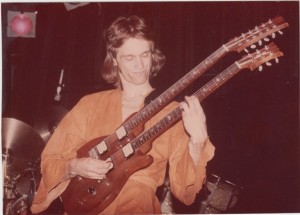 STAN: It was 1975. Rick and I were with Happy The Man, doing a concert somewhere in Annapolis. We were strolling down West Street when someone recognized us. They were coming to see us that night, and they asked if we’d heard of Paul Reed Smith. We’re, like, “No. Who’s that?” Turns out, he’s this young kid who builds guitars. “He’s up on the third floor of this little building here. You can just go right up to his shop.” So, Rick and I walked up to this guy’s shop. Here’s this little skinny kid, maybe 20 years old, carving on a guitar. We hit it off with him and couldn’t believe he was making these guitars by hand. He had only built a handful, maybe 3 or 4 guitars at that point, but he was one of these eclectic, gifted guys. It was kismet. We commissioned him to build a couple of guitars for us. He built Rick a bass, and he built me a double-neck guitar with a twelve- string on top and a six-string on the bottom. We were two of the first guys to commission guitars from him. He had built one guitar for Peter Frampton, and he had built one for a guy in a band called Artful Dodger, but those were some of the only ones he had built, and he gave those to the guys. We were the first guys to actually buy guitars from him, and he was ecstatic. We developed a wonderful relationship with him. He’s since become one of the greatest guitar builders on the planet and still builds a wonderful product to this day. I recently got both of my guitars back from him; I had them both refinished. They came out with a new color called” black gold” that I fell in love with, and I said, “Okay, you have got to do this to my guitars.” Paul’s a gifted guy who took the best of Fender
STAN: It was 1975. Rick and I were with Happy The Man, doing a concert somewhere in Annapolis. We were strolling down West Street when someone recognized us. They were coming to see us that night, and they asked if we’d heard of Paul Reed Smith. We’re, like, “No. Who’s that?” Turns out, he’s this young kid who builds guitars. “He’s up on the third floor of this little building here. You can just go right up to his shop.” So, Rick and I walked up to this guy’s shop. Here’s this little skinny kid, maybe 20 years old, carving on a guitar. We hit it off with him and couldn’t believe he was making these guitars by hand. He had only built a handful, maybe 3 or 4 guitars at that point, but he was one of these eclectic, gifted guys. It was kismet. We commissioned him to build a couple of guitars for us. He built Rick a bass, and he built me a double-neck guitar with a twelve- string on top and a six-string on the bottom. We were two of the first guys to commission guitars from him. He had built one guitar for Peter Frampton, and he had built one for a guy in a band called Artful Dodger, but those were some of the only ones he had built, and he gave those to the guys. We were the first guys to actually buy guitars from him, and he was ecstatic. We developed a wonderful relationship with him. He’s since become one of the greatest guitar builders on the planet and still builds a wonderful product to this day. I recently got both of my guitars back from him; I had them both refinished. They came out with a new color called” black gold” that I fell in love with, and I said, “Okay, you have got to do this to my guitars.” Paul’s a gifted guy who took the best of Fender 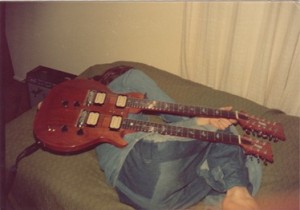 and Gibson and made his own out of it. He’s stayed true to his craft and his principals, and he’s a good guy.
and Gibson and made his own out of it. He’s stayed true to his craft and his principals, and he’s a good guy.
ATI: When did you move to D.C., and what happened there?
STAN: D.C. has always sort of been a home base, so I’ve always been around the northern Virginia area. Even now, we’re within an hour and a half from D.C. and northern Virginia. I’ve always had a lot of connections in this area from Happy The Man, and it seems a lot of the people from Germany ended up back in this neck of the woods. The whole East Coast region has been a good hub.
ATI: I’m going to go off on a tangent here. Why do you think Progressive rock is better received in Europe than it is in the U.S.?
STAN: I think European audiences have a better attention span. It’s more in their traditional bone to sit and listen and appreciate music, and then go nuts after the songs. In this country it seems that you go nuts during the whole song and after the song. The listeners over here don’t know how to sit and listen to what’s really going on. That’s the essence of the whole thing, and I noticed it especially after being in Europe all those years, seeing so many concerts and then coming back to the states to one of my first shows. Immediately, when the band comes out, the whole place stands up and stays standing up for the whole show. I’m, like, “What the hell is this? Sit down! Sit down and appreciate the music and, at the end of the song, stand up and go nuts.” That’s my analogy of one of the main differences, Maybe Europeans have deeper listening roots because of all the classical music roots that started in Europe. I think it’s in their DNA somewhat more. Music of a more sophisticated nature requires attention on the part of the listener. People in this country have a short attention span. A lot of Prog music has long, epic pieces, though Happy The Man did not necessarily ascribe to that. We broke with the Prog rock format by having some 3-4-minute-long pieces. But you still had to pay attention to appreciate what was going on in that 3-4 minutes. You’ve got to pay attention. You’ve got to focus on it.
ATI: Now we come to The Cellar Door. Why was it a great music venue, and what happened there to further the band’s career?
STAN: The Cellar Door was just a wonderful little venue. It maybe held a hundred people at the most. Right there on M Street, it was probably the coolest room in Washington D.C. The ownership really loved us, so we got to play there a lot. We almost became the house band there. I think there was a period when we were playing there every month. That’s where we 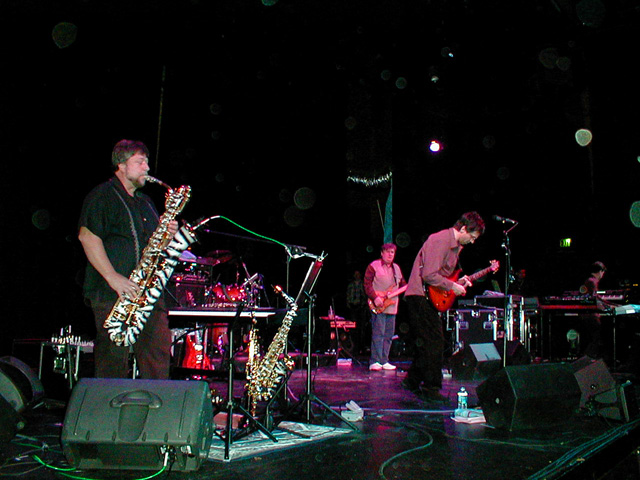 really got our roots in the D.C. area and became quite notorious. It was a prestigious room to play, and we played it so often, it helped get us well known in a short period of time. Real artsy, real dark, and they always had national acts. We were very fortunate to play there, because we weren’t a national act yet.
really got our roots in the D.C. area and became quite notorious. It was a prestigious room to play, and we played it so often, it helped get us well known in a short period of time. Real artsy, real dark, and they always had national acts. We were very fortunate to play there, because we weren’t a national act yet.
ATI: It was around that time you performed in front of iconic record mogul Clive Davis? What was going through your head when you played and what was his reaction?
STAN: I knew a lot about Clive Davis, so I was in awe of meeting him and playing for him, because he had just formed Arista Records. They brought us up to New York to do a showcase in a little rehearsal studio. It was very exciting. It was us up on a full stage with 7-10 chairs in the audience. Clive sat dead-center in the front row, relaxed back, closed his eyes, put his hands behind his head, his legs straight out, and that’s how he was for our whole 45-minute set. No real reaction or anything from him. A lot of the people around him were showing much more reaction and flipping out and clapping. He didn’t clap. He didn’t do anything. We had never done any showcases per se for any major record label, so this was our first experience. I think we did what we were supposed to do, because he came up afterwards, and the first words out of his mouth were, “Wow. I don’t really understand this music. It’s way above my head, but my head of A&R, Rick Chertoff says you guys are incredible, and we should sign you, So welcome to Arista.”
Thank God Rick Chertoff was there, because we wouldn’t have gotten signed if Rick hadn’t been there.
ATI: Why did you go to all instrumental just before you signed with Arista?
STAN: During the whole D.C. period, we had been an all-instrumental band, and that’s how we made our nut—doing full symphonic, instrumental shows with a cool light show. That’s what we were known for. That’s how Arista saw us. The showcase did not have a single vocal tune in it. So we got signed off on that, but when it came down to actually negotiating the contract, it became a sticking point. They said, “If we knew there was going to be hope down the road that there would be some vocals, we’ll sign you right this minute. But it’s a sticking point for us, because we don’t think an all-instrumental band has a shot in hell of making it.” Blah, blah, blah. Everybody in the band was looking at each other—“You want to sing? I don’t want to sing. Do you want to sing?” And I said, “Well, shit. I sang in choir. I’ll sing.” That’s how I started singing.
ATI: What was that like for you singing after all that time?
STAN: I didn’t care for it. I was the reluctant front man. I had always considered myself the anti-rock star. I had no interest in being a front man vocalist. I didn’t think I had that in my persona. I agreed because it was going to get us signed. They were going to sign us if someone sings a song, so we had to work up a couple of vocal tunes to be on that first album. That’s why there are only two and, on the second album, there’s only one. It was not our strength. Our strength was full-instrumental, symphonic music.
ATI: It was about that time Peter Gabriel showed an interest in Happy The Man. What happened?
STAN: Yes, it was at this same period. We had a really cool connection, because our bass player, Rick Kennell, had 2 or 3 dear friends who worked on the road crew for Genesis. Dale Newman and Dan Owen handled the guitars, and the main sound man for Genesis was a fellow named Craig Schurtz. He was Rick’s good buddy, and during the early period of Happy The Man, Rick had been passing cassette tapes to these buddies of his, and they had been playing them for the guys in Genesis. That was how they knew of us. In the spring of ‘76, Peter Gabriel had left Genesis, and he got into touch (or his management got in touch) with our management. Cellar Door loved us so much that their booking agency management firm took us over. They said they had five bands they were checking out to be Peter’s back-up band–two in England and three in the states—and we were one of the bands being considered. We were absolutely very interested, and we’d heard horror stories of all these other bands; Peter had walked in and spent 10 or 15 minutes, got frustrated and left. We were, like, “Oh, my God, he saved us for last probably because, having heard some of our music, he felt that we were going to be a little more of what he was looking for.” And we were the last band he checked out.
 Peter was absolutely my favorite rock star hero in the world, because seeing him with Genesis—there was nothing like that. It was such a theatrical production that you left those shows altered, changed. They had affected me, and this guy was one of the biggest rock stars I had ever met. Peter came in, met us and sat down at the piano. He said, “Let me play you a little bit of what I’m working on,” and he closed his eyes, played a few chords, sang 1 or 2 lines, and then just stopped still with his eyes closed. I remember us in Happy The Man standing around kind of nudging each other. We’re thinking, “What? Are we supposed to say something? What’s he doing?” Then, out of nowhere, he just started singing again. It seemed the stuff was so new for him, that he was trying to think of where it would go next. It was the embryonic stage of the music, and we proceeded—over the next 7 1/2 hours—to work with him extensively on two of the songs. He used a lot of the arrangements we–especially Kit and me—came up with for two of the tunes on that first record.
Peter was absolutely my favorite rock star hero in the world, because seeing him with Genesis—there was nothing like that. It was such a theatrical production that you left those shows altered, changed. They had affected me, and this guy was one of the biggest rock stars I had ever met. Peter came in, met us and sat down at the piano. He said, “Let me play you a little bit of what I’m working on,” and he closed his eyes, played a few chords, sang 1 or 2 lines, and then just stopped still with his eyes closed. I remember us in Happy The Man standing around kind of nudging each other. We’re thinking, “What? Are we supposed to say something? What’s he doing?” Then, out of nowhere, he just started singing again. It seemed the stuff was so new for him, that he was trying to think of where it would go next. It was the embryonic stage of the music, and we proceeded—over the next 7 1/2 hours—to work with him extensively on two of the songs. He used a lot of the arrangements we–especially Kit and me—came up with for two of the tunes on that first record.
It was a wonderful experience. God, here we were playing music with Peter Gabriel—pretty powerful stuff—and he left very excited. He really liked the band. He told our management he wanted us exclusively. But, God, we had worked about six years to get a deal on the table from Arista Records. We really didn’t want to give that up, but we were willing to give his project top priority. I was staying at the manager’s house during this period of time, a fellow named Bob Steinem, and I can remember Peter calling almost every day to chat with me, to see if there was any way at all that he could get just Kit and me? We were the two of the band that he wanted. He would take the whole band, but he loved Kit and me. I said, “We’re flattered, but no. It’s the whole band or nothing, because this is family. We’d been together six years, and he understood that. We spent a good couple of weeks going back and forth, trying to figure out if we could do it, even with us giving his project top priority.
We ended up with no deal because he wanted us exclusively, and we weren’t willing to give up our record deal. But Peter’s wanting us so bad actually helped kick Arista in the ass to sign us quicker, so it was a blessing in that way. We did get signed to Arista, even though they dropped us two years later. In ’79, Peter’s management found out about Happy The Man breaking up and got in touch with me to see if I was interested in coming to England to work with Peter on or, at least, put some stuff on tape for Peter, because he was starting his third album and hadn’t gotten David Rhodes in the band yet. I was, again, extremely flattered.
If I have any regrets at all in my life (though I’ve tried to live life with no regrets), that’s the only one I can think of. I probably should have hopped on it, because it was a wonderful opportunity. Even my mother said, “Peter Gabriel. Isn’t that a fellow you like?” I said, “Yeah, he’s probably my favorite Progressive rock singer–period. And she said, “Well, don’t you think you should do that?” It was kind of cute hearing her think she knew about Prog.
At that point I had discovered this singer, a fellow named Rocky Ruckman, who I knew in my gut was a star. The guy just had a four-octave voice of full balls, like the most ballsy rock singer. Rocky was a cross between Steve Marriott and Ian Gillan, and he was a brilliant songwriter. He was interested in working with me, so that was the end of the Peter Gabriel story for me. I turned him down and went another route with my band Vision and Rocky.
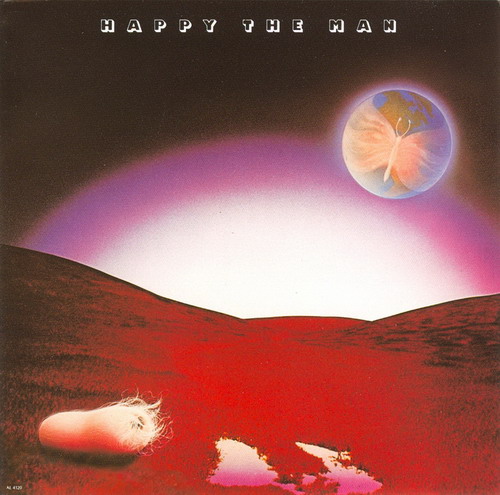 ATI: Let’s talk about your time with Arista. How did you know to request Ken Scott the Producer at Arista?
ATI: Let’s talk about your time with Arista. How did you know to request Ken Scott the Producer at Arista?
STAN: Arista asked us who we were interested in producing our first album, and Ken was our top choice. He had just done Birds of Fire by the Mahavishnu Orchestra. We felt a kinship with the record and, with our style, we knew he was the guy we wanted. When they approached him, we learned he loved our music so much that he was willing to cut his normal production rate just to be part of it, because we didn’t have the budget to pay him his normal rate.
ATI: What was it like to work with him?
STAN: It was glorious working with Ken Scott. He was a living legend as a producer, having worked with the Beatles and Supertramp. He had done both Supertramp albums; Crime of the Century and Crisis? What Crisis? came out at that same time too. Ken’s list of credits was sick—Elton and David Bowie—he did all the early David Bowie stuff. He had stories like crazy. He was a story-teller, so we’d just sit and listen. It was part of his British personality. He would come into the studio every day with a scent of, what was it…not B.O. but some kind of scotch. He had an affinity for J&B scotch. He would come in every day with a fresh bottle and plop it down. By the end of the day, he would have gone through that whole bottle. I don’t know how he could drink that much; it was his poison of choice, but he was such a wonderful, gifted engineer/producer to work with—it was like going to school. We learned so much making those two records and heard so many wonderful stories about the Beatles, Elton, Ziggy and Jimi. He had great “war” stories, as we liked to call them. He developed such a love for us that, after some of the sessions, we would go back to his house and spend time with him and his wife in their backyard in the pool and Jacuzzi. It was a very friendly and warm relationship. It was a great gift working with Ken Scott.
ATI: Speaking of gifts, were you meeting any of your personal rock idols along on your journey? Do you have any stories?
STAN: One story in particular affected me when I was fifteen and a budding guitarist. Steve Howe (Yes, Asia) was my favorite guitar player on the planet. I knew every lick he did. It was one of my first times seeing him. Security was nothing in Europe. It was so easy to get backstage at shows over there, it wasn’t even funny, so we went back and talked to the guys in Yes. I remember Jon Anderson being sweet as can be and taking us up on stage, showing us the Mellotrons and all the gear. He was really spending quality time with us and it’s, like, “Wow! Here’s a really wonderful, gentle, pure spirit, just like his voice. This is cool. I want to be like this guy.”
 Then Steve Howe emerges from the downstairs dressing room, and Jon said, “Steve, come here. You’ve got to meet this kid, man. You’re his hero. You’re his favorite guitar player. He knows every lick you play.”
Then Steve Howe emerges from the downstairs dressing room, and Jon said, “Steve, come here. You’ve got to meet this kid, man. You’re his hero. You’re his favorite guitar player. He knows every lick you play.”
I’ll never forget it. He looked at me, eyeballing me from head to toe. Granted, he had his coat on, he had his guitar, and he was ready to go. He literally looked me up and down, said, “Later, mate,” and walked away. It affected me so greatly that, from that day forward, I never heard Yes quite the same way. Wow, really? There’s a guy in your band who couldn’t be sweeter, who’s spending intimate time with us, and you can’t come over and say hello? You can’t even shake my fucking hand? It affected me so greatly that, on that day, I decided I’ll never be like this guy. It’s such a shame because he’s such a great guitarist, and the thing is, I’ve heard similar tales about him from other respected guitar players more recently who said, “Wow. That happened when I met him.” To me, if you’re in a profile position like he is and you don’t have the time to say hello to one of your fans, I think that’s fucked up. There’s something wrong with that. You owe that to your fans. I didn’t buy anymore Yes albums after that. The last album I bought was Close To the Edge.
ATI: They say should never meet your idol because, more often than not, you’ll be disappointed.
STAN: It was very true in this case. I want to put it out there to any and all aspiring musicians—man, retain your humbleness. Remember who you are because it’s going to come back and haunt you, if you don’t. I believe in being kind and nice. It’s pretty simple for some people, but difficult for others, I guess. I think it’s real smart to stay humble. Simple as that.
ATI: Now I’d like to hear more about Rocky Ruckman and Vision.
STAN: Rocky was in a band called Skywalker that opened up for Happy The Man in Cumberland, Maryland at a college. I heard this guy belt this stuff out, met him and said, “Man, if Happy The Man ever breaks up, I’m calling you,” and he said, “Man, I’d be honored.” Here was a guy with a gruff exterior and an 8th grade education who could sit down and write lyrics to a song in an instant. He just channeled it. He never crossed anything out. He would hear a piece of music—I’d play a little lick—and he would write lyrics. “Okay, finished!”—and they were brilliant. His lyrics were wonderful. He was a gifted fellow with an amazing voice.
We did a project with Eddie Kramer, the producer who did all the early Led Zeppelin and Hendrix albums, so he’s another hero of mine that I got to meet and work with. We did a brilliant eight-song demo with Rocky, and we actually got record companies interested; we performed in a showcase at the Ritz in New York for around 12 record companies. They came ready to sign that night, but Rocky went out and tried to be a sexy front guy, which was not his style. He was a gruff, rough-and-tumble, AC/DC-type of front guy. I don’t know why he did it, other than I think he was so uptight and nervous about all these record companies, and he had heard comments like, “He’s not a great looking guy,” and “Boy, he can sure sing, but, yeah, he is not real great to look at.” So he tried to be a sexier, Rod Stewart-like performer, alienating and turning off every single record company, so that was that.
We continued a little bit longer and actually had fun with it, but it became more of a half cover band and half original band after that. Until then, it had been all our own music but after that we decided to start doing covers, too, so we could play out and earn a living. Vision gave us a very successful livelihood around the Baltimore and DC region for 5 or 6 years. We opened up for a lot of major bands, but the band had run its gamut at that point. So David Bach and I did an offshoot of that band called One by One, which did mostly original music.
ATI: What was your life like when you were part of One by One? Were you fulfilled and happy?
STAN: Yeah, I really was. We were doing almost all original music, and it was a real fun period because 80’s music was in full swing. We had a really good rhythm section and could pull off a lot of the hipper 80’s music, as well as doing our own stuff. We were very successful in the northern Virginia/Baltimore region, but only that region.
ATI: So is that why you took Paul Reed Smith’s offer to take his place in the Band of 1000 Names?
STAN: Yeah. I knew about the Band of 1000 Names, which was the band Paul had played in for years. He was getting so busy with the growth of his factory he just didn’t have time to do it. The band had really great bass player named Carey Ziegler, who called me and said, “Man, I wonder if you’re interested in doing this thing with us.” I thought it would probably be fun; they were an all- cover band, but it was more rock—Eagles, Rush, Bad Company and other classic rock stuff. I joined and had a lot of fun for a couple of years. There were only 1 or 2 opportunities when Paul sat in, and we were able to play together. Paul is actually quite a tasty guitar player.
ATI: How did that lead to Avalon?
STAN: That would have been the very next thing. One of the keyboardists, a good friend of ours named Bill Plummer, is a gifted sound man (he did sound for Happy The Man during a lot of its hey-day). He did sound on one of the first Whitney Houston tours and for Anita Baker; he’d done a lot of major tours as the front house PA guy. He was also a very good keyboard player, especially on mini-Moog, because he took lessons from Kit Watkins back in the early- to mid-70’s. He had a lot of Kit’s mojo in his playing. Bill and I had toyed around with putting a cover band together that did nothing but hip cover stuff and did none of the standardized covers. We formed Avalon around 1990. We did Pink Floyd, Peter Gabriel, Jeff Beck and some King Crimson, basically picking our coolest, favorite proggy stuff over the years, and the band became very successful. We did it to fight against all the standardized rock played in all the clubs, and we honestly didn’t think it would be that successful. We were just doing it for ourselves, and a lot of times that seems like the best thing to do. If you do something for yourself and think it has value, hopefully it will have value for somebody listening. This band really took off. People just adored it; it was a lot of fun, and we made good money with it.
ATI: Eventually, you moved to L.A. Why?
STAN: I didn’t want to get to the end of my life and wonder, “What if I had moved out to L.A. and given it a shot?” So, the week of my 40th birthday in 1994, I moved out to Los Angeles.
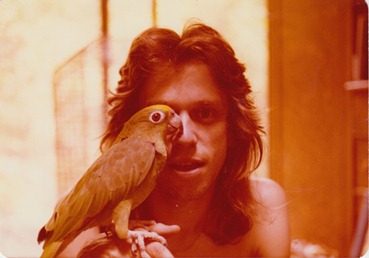 ATI: With Merlin the Parrot, I’m told. Tell us about Merlin.
ATI: With Merlin the Parrot, I’m told. Tell us about Merlin.
STAN: I had always been into birds, and he was the only pet I had at that point. Merlin was a yellow-headed Amazon parrot—a sweetheart of a bird. I rented a big Penske truck; I had a perch with a suction cup on it, and I stuck it on the passenger side window. He sat on his perch, and we drove across country. We got a third of the way across, got to a motel, and I put him in a tiny travel cage to sneak him in my room with me. We’d wake up the next morning and drive some more.
ATI: Did Merlin talk?
STAN: Oh, yeah, he talked a bunch. He had quite a vocabulary, mostly standard stuff. “Hi, how are you?” “What are you doing?” “Where are you going?” He had a couple of great laughs, and he had some loud squawks too. I had to get rid of him later because, in his old age, he got way nasty and very aggressive with anybody and everybody. People told me it was because he never had a girlfriend, and he was just frustrated. Whatever it was, he was biting the flesh of too many people.
I found a wonderful home for him with a lady who just adored him and he adored her. I knew he had a good home.
ATI: Where did you live?
STAN: North Hollywood. I lived with a dear friend of mine named Fred Brown. I went to high school with him in Germany. His older brother Tony and I were musical buddies. Tony played drums in Ulysses. Fred was Tony’s younger brother and a wonderful, wonderful friend–probably more of a friend than Tony at that stage in my life. We hung out all the time, and Fred invited me to live with him. Fred was a heavyweight lawyer for Warner Brothers Records for many years, and staying with him ended up being quite the gift.
ATI: Why’s that?
STAN: It’s a tough nut to crack out there. My buddy Fred made it much easier for me than someone moving out there fresh and cold. He knew the music scene and everything in that area, so I had the best tour guide I could possibly have. I wanted to go the singer/songwriter route; I had never done any solo acoustic and singing. They had a lot of rooms out there for it, and Fred told me about all the hip rooms. One in particular called Ghengis Cohen which was probably the most notable singer/songwriter room. I’d write music and go there to play it. I’d do my 15-to-20-minute set, which was as much as they’d let you play, and then they would shuffle in the next guy.
L.A. was the way I thought it was going to be; I presumed it to be an image-oriented place and that’s what it was. Everybody was either a musician or an actor or a model, but they were all working in restaurants, trying to make a go of it out there. It’s very much touch-and-go. I had to get other work, and there were a lot of temp agencies out there. That work was really cool, because I didn’t know where you would be from day to day. When I got a call, sometimes I’d be at Hanna Barbera, sometimes at Disney. Those were cool gigs for me because I was around cartoons I loved, seeing original cells from Bambi and some of the old classics. Then I got with one temp job with The Entertainment Coalition; it was insurance underwriting for the film industry. They offered me a full time position, and I became the manager of the file room there. That was my gig for most of my period out there.
ATI: Did you like working solo?
STAN: Yeah. There was something I liked about it. There’s something really scary about it, too, so I ended up putting together a little three-piece band called Spirit Noise for a short stint. It was very short lived, because the band scene out there is insane. It’s worse than the singer/songwriter scene if you want to play the Whiskey and the Troubadour or any of the main rooms out there. At the Viper room, you have to buy 200 tickets and sell them on your own, so you’re already out money before you even played the place, and then it’s the same thing—you get on and play twenty minutes, thirty, if you’re lucky. Time’s up. They cut the power on you if you go past your slot, and there’d be five, six or seven bands a night. It was literally like a cattle call. You were just on and off. The thing I discovered was that the industry was so different than it was back when I got signed. Record-industry execs don’t go out and frequent those places like they used to back in the 70’s, so the odds of getting seen by a major label and getting signed, that dream part of the music world is long gone. It’s a fluke if you make enough stink at a room that the industry will hear about you. “So and so is back at the Troubadour. Let’s go check him out.” They weren’t interested in anyone over 40 for the most part. They’re still very image-oriented, and I didn’t work well at all with the whole image- making machinery of Hollywood. Part of my anti-rock star consciousness, I guess.
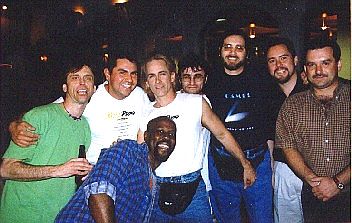 Luckily for me, I bumped into this other band called Ten Jinn, a progressive rock band that put a little ad in the local music rag: “Progressive rock band looking for lead guitarist. Must be able to cover…” I said, “Well, this is interesting.” I called them up and spoke to John Strauss, who hadn’t heard of Happy The Man, but everybody else in his band had and were, like, “Are you kidding? You got a call from a guy from Happy The Man? Call him back!” I checked these guys out and it was interesting stuff—had some good Prog tinges to it. They took me in the band and, shortly after, we went to the Baja Prog Festival in ‘97 or ‘98. It’s a wonderful progressive rock festival held in Mexicali, Mexico. The main festival was Saturday and Sunday. We were the Friday night pre-show band for all the acts playing the weekend and all the promoters and people affiliated with the festival. So there I am, playing with Ten Jinn on this Friday night, and word gets around that the lead guitarist is from Happy The Man. When we leave the stage, I’m inundated by thunderous applause and people surrounding me. I’m like, “Wow, man! What’s going on? What are these people doing?” It was my first encounter ever, or at least since Happy The Man had broken up, with people who not only knew who Happy The Man was but held it in high reverence. These guys from France literally went down on the floor and started bowing to me. It was crazy.
Luckily for me, I bumped into this other band called Ten Jinn, a progressive rock band that put a little ad in the local music rag: “Progressive rock band looking for lead guitarist. Must be able to cover…” I said, “Well, this is interesting.” I called them up and spoke to John Strauss, who hadn’t heard of Happy The Man, but everybody else in his band had and were, like, “Are you kidding? You got a call from a guy from Happy The Man? Call him back!” I checked these guys out and it was interesting stuff—had some good Prog tinges to it. They took me in the band and, shortly after, we went to the Baja Prog Festival in ‘97 or ‘98. It’s a wonderful progressive rock festival held in Mexicali, Mexico. The main festival was Saturday and Sunday. We were the Friday night pre-show band for all the acts playing the weekend and all the promoters and people affiliated with the festival. So there I am, playing with Ten Jinn on this Friday night, and word gets around that the lead guitarist is from Happy The Man. When we leave the stage, I’m inundated by thunderous applause and people surrounding me. I’m like, “Wow, man! What’s going on? What are these people doing?” It was my first encounter ever, or at least since Happy The Man had broken up, with people who not only knew who Happy The Man was but held it in high reverence. These guys from France literally went down on the floor and started bowing to me. It was crazy.
They invited us to play the festival the following year, and we actually played during the afternoon on Saturday. It was there promoters (a fellow named Rob LaDuca and his partner Chad Hutchinson) from a festival called Nearfest® [the largest progressive music festival in the United States, and has been called “the most prestigious” in the world] approached me. Nearfest® is held at Lehigh University up in Bethlehem, Pennsylvania. These two guys came up to me and said,
“Man, if you’d put Happy The Man back together, even with just 2 or 3 of the original guys, you could headline next year’s Nearfest®.”
I was like, “Yeah, right. You guys are blowing smoke up my butt here. What are you talking about?”
And they said, “No, no, really. We’ll make you a bona fide offer.”
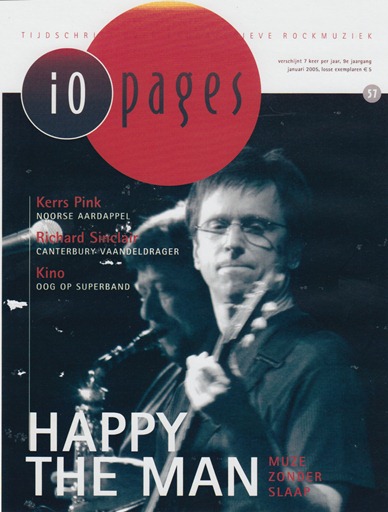 I said, “Man, nobody knows who Happy The Man is,” and they said, “A lot of people know who Happy The Man is. Have you gotten on the Internet and searched?”
I said, “Man, nobody knows who Happy The Man is,” and they said, “A lot of people know who Happy The Man is. Have you gotten on the Internet and searched?”
When I said “No, I don’t even have a computer,” they proceeded to break out a laptop and pull up all these Happy The Man fan sites that had been put up by fans all over the world. I was blown away. Oh, my God. They showed me one site after another and convinced me that, maybe, there was a market there. They said, “We’re going back to our business planners, and we’re going to make you a bona fide offer.”
They came back with a really sick offer of money, more than Happy The Man had ever seen before. It was enough to make me want to move back to the East Coast. I immediately called Frank and Rick. They were the only two I called from Happy The Man to make sure they were interested. They couldn’t believe the amount we were being offered for a 90-minute set either, so they were all aboard. At that moment, we said, “Hey let’s do this as long as it stays fun, which was also our thinking back in our heyday, but as soon as it stops being fun we’re out of here. I moved back to the East Coast in 2000. I moved in with Frank Wyatt in Galax, VA, and we started writing new Happy The Man music.
The reunion gig was wonderful, because a lot of people who never saw Happy The Man in the old days, and didn’t think they would ever get to see Happy The Man, finally got their chance at Nearfest® 2000. People flew in from all over the planet for that show; lots of them came up to us and said, “Man, we flew over here, and we can’t believe Happy The Man is back together. We thought we would never get a chance to see it, and that’s why we’re here.” It was pretty amazing.
ATI: During that incarnation of HTM, the band put out an album titled The Muse Awakens, released in 2004. Not long after, you and Frank put out another album, right?
STAN: That was called Pedal Giant Animals. The songs were rejects that Happy The Man wasn’t interested in doing, so Frank and I said, “Screw it. Let’s put out our own album.” A couple of HTM people weren’t thrilled with the idea, and we said, “Hell, you guys didn’t want to do these tunes, so we’re going to do them.” They said, “We might have eventually have gotten to them,” and we said, “Well that’s too bad. We’re doing them.” It was right around the same time period where Happy The Man was winding down. We had done The Muse Awakens album, and there was talk of a second record, but I wasn’t interested in continuing, because it had stopped being fun. Pedal Giant Animal was the transition to the next project for Frank and me. It was the first stage of what eventually became the Oblivion Sun band, which is the band we have to this day.
ATI: Why was it important for you to play live with Oblivion Sun?
 STAN: For us, it was the magic of being able to pull off intricate, sophisticated music, and to pull it off live was always a bit of a challenge. We knew our audience was a captive audience, because they already knew who we were. They knew our roots from Happy The Man, and it was pretty much the same as Happy The Man. People came to hear our music the way it was on our album. Our only real taste of “rock stardom” was doing shows with Happy The Man and having a couple of thousand people on their feet screaming. It was the only experience in my whole life with true adoration. Oblivion Sun carried the same torch as Happy The Man but did a lot more vocals with a bit more of a rock ‘n’ roll guitar-oriented edge as opposed to the mini-Moog, which was the main voice for Happy The Man.
STAN: For us, it was the magic of being able to pull off intricate, sophisticated music, and to pull it off live was always a bit of a challenge. We knew our audience was a captive audience, because they already knew who we were. They knew our roots from Happy The Man, and it was pretty much the same as Happy The Man. People came to hear our music the way it was on our album. Our only real taste of “rock stardom” was doing shows with Happy The Man and having a couple of thousand people on their feet screaming. It was the only experience in my whole life with true adoration. Oblivion Sun carried the same torch as Happy The Man but did a lot more vocals with a bit more of a rock ‘n’ roll guitar-oriented edge as opposed to the mini-Moog, which was the main voice for Happy The Man.
ATI: Let’s talk about your band names. How did Happy The Man get its name, and what is Oblivion Sun?
STAN: Happy the Man was actually my brother Ken came up with Happy The Man, and his main inspiration was from Goethe’s Faust.
O happy the man who can still hope though drowned in a sea of error!
There’s a Happy The Man quote in the Bible also [Proverbs 3:13].
Happy is the man that findeth wisdom, and the man that getteth understanding.
We just loved it. We thought it was interesting and different and “Wow, what the hell is Happy The Man?” A lot of people thought we took it from a Genesis song titled “Happy The Man” (released as a single in 1972, and later appeared on Genesis compilation albums). It wasn’t, but it was a fun little Prog tie-in for us. Oblivion Sun is a book of poetry and prose which Frank had written. We were going to call the band Pedal Giant Animals, which I still love to this day. It was between those two names, and we ended up going with Oblivion Sun.
ATI: At the age of 51, you met and married LeeAnne. How did you meet? What attracted you to her and what do you think attracted her to you?
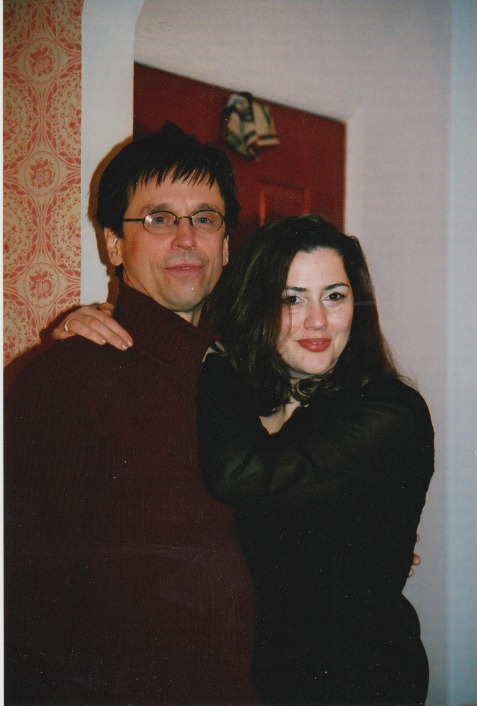 STAN: She was in a rock band that was playing local Baltimore rooms. One of the guitar players is a friend of mine, and he couldn’t make it for a couple of gigs, so their keyboardist got in touch with me to see if I was interested in filling in on a couple of these gigs. I said, “Yeah sure.” It sounded easy enough so I filled in for extra work, met her and was immediately attracted to her—a very vivacious brunette woman. She could sing as well but, through the whole show, I could see her having a lot of trouble hearing herself. I told her I just started doing some acoustic work around town, and I’m doing it solo, but I’ve had a lot of rooms ask if I had a duo. Would you be interested in playing some of this stuff? I guaranteed she’d be able to hear herself much better than she’d ever heard herself with a rock band. It intrigued her enough to try it out, and we started singing. Our voices blended great together. That’s how we met and started and, a few years later, we got married. We started the acoustic thing, and that’s mostly what we’ve done for the past ten years. We earned our livelihood as a duo, though I still do gigs by myself, too, in northern Virginia, where I’d worked for many years.
STAN: She was in a rock band that was playing local Baltimore rooms. One of the guitar players is a friend of mine, and he couldn’t make it for a couple of gigs, so their keyboardist got in touch with me to see if I was interested in filling in on a couple of these gigs. I said, “Yeah sure.” It sounded easy enough so I filled in for extra work, met her and was immediately attracted to her—a very vivacious brunette woman. She could sing as well but, through the whole show, I could see her having a lot of trouble hearing herself. I told her I just started doing some acoustic work around town, and I’m doing it solo, but I’ve had a lot of rooms ask if I had a duo. Would you be interested in playing some of this stuff? I guaranteed she’d be able to hear herself much better than she’d ever heard herself with a rock band. It intrigued her enough to try it out, and we started singing. Our voices blended great together. That’s how we met and started and, a few years later, we got married. We started the acoustic thing, and that’s mostly what we’ve done for the past ten years. We earned our livelihood as a duo, though I still do gigs by myself, too, in northern Virginia, where I’d worked for many years.
ATI: Does the duo have a name?
STAN: Stan and LeeAnne—nothing real clever. Our names rhyme, it’s nice and simple, and people will know who we are. We put out a CD of some of the cover tunes from one of our live gigs, and we’ve sold that at our shows for many years. One of the projects we’ve had on hold for years is putting out a CD of our own music, and now we finally have the time to concentrate on it. We’ve earned our livelihood singing for our supper.
ATI: In a way, LeeAnne saved your life when you told her about your friend Fred Brown’s cancer. Tell me about that ordeal.
STAN: My left tonsil had been a bit swollen for a period of time when we were working a lot—at least 4 or 5 nights a week. I was singing a lot of solo gigs for 3-4 hours a night in northern Virginia and, for at least a year or two, she noticed this lump and said, “You should probably get this thing checked out.” I don’t consider myself much of a typical guy but, in this regard, I guess I was, because I shrugged it off as nothing. It’s just a swollen tonsil. I was singing a lot. No biggie.
It took my friend Fred Bown calling me four years ago to tell me that he had esophageal cancer. When I got off of that particular phone call, LeeAnne looked at me. She said, “Okay, do you need a barn to fall on you or what here?” That got me off my ass to finally go get it checked out and the doctor said, ”I don’t know what it is, but it shouldn’t be there, so we’re going to do surgery, remove it, and do a biopsy on it.” He thought it was probably just a big calcium deposit that’s been there for years, and it’s no big deal. He also said there’s an ever-so-slight chance that it could be a very rare cancer called Adenoid Cystic Carcinoma, but there are barely 5,000 cases of it worldwide, and I’d have a better chance of getting hit by lightning.
The week of my birthday, the doctor calls us back and, lo and behold, it is a dreaded stroke of lightening, Adenoid Cystic Carcinoma. We scheduled a second surgery to go back in to remove any and all lymph glands that could have been compromised, because this thing likes to jump through the lymph glands and can even reoccur in your lungs. Fortunately, Maryland is a pretty good state to get cancer in, if you’re going to get cancer. They have a lot of wonderful hospitals here, including Johns Hopkins. For the second surgery, I was extremely fortunate to find a Johns Hopkins doctor who had a grant to study Adenoid Cystic Carcinoma, and this guy knew his shit with this cancer. He did the second surgery, and LeeAnne asked him to do a nice, clean cut when he put me back together. He cut right near my old-man crease, so [the scar] is hard to see. But it’s a good five-inch cut from behind my ear to the center of my throat.
Then I followed that up with 36 radiation treatments. No chemotherapy. Just radiation treatments to annihilate it. When they did tests afterwards, they said I still have a high white- blood-cell count, so they did further tests and discovered I had CLL [Chronic Lymphocytic Leukemia], which is a common type of leukemia a lot of men over forty get. Thankfully, both of my cancers are very slow-moving cancers. They said the leukemia is something you can have10, 15, 20 years before you have to do anything for it, so every six months I get a barrage of lab work done to keep track of the numbers. There’s nothing they can give me for it. There are no medicines, no dietary stuff. If it ever moves to a higher stage, I’ll probably have to have chemo or something for that. The main cancer, Adenoid Cystic Carcinoma, has been in remission now for three years, and after five years, they can say I’m cured, but even that’s iffy, because they don’t know enough about this cancer, and it could still rear its ugly head again in some other organ. For the time being, all is well.
ATI: What were the radiation treatments like for you?
STAN: The radiation thing is actually a cute story. You’re strapped to a table with this wet, plastic mesh thing they form-fit over your entire head and shoulders. You’re pinned down flat on the table for about 20 minutes. Most people need a Valium or some kind of sedation to do this thing, and I would go in there every day, hop up on the table and say, “Strap me in, ladies!” They loved me, and they wondered, “Why can’t more people have your attitude?” I don’t know what made me have that attitude, but it is just who I am.
ATI: Were you writing songs in your head while you were sitting there 20 minutes?
STAN: Nah. I was meditating and breathing during the 20-minute session, because you literally cannot move one iota. It’s imperative that you stay stationary, because it’s a precise treatment. The side effect from radiation is a loss of energy. There are days that are worse than others–sometimes I feel like I have to nap all day. That’s my only side effect from the radiation, other than the area where the radiation was focused. I have a whole patch of skin where the hair will never grow back, so I have a weird beard. They said I wouldn’t get my taste buds back, but, miraculously, they came fully back to me. They said I would have a tough time with my salivary glands, and those are okay now. They said I wouldn’t have feeling in that area of my neck or behind my ear, and, ever so slowly, I’m feeling sensation in those areas. The energy drain is a side effect I’ll always have from it
ATI: Wow. So what’s going on in your head at this point in your life? What are you thinking and what are you feeling?
STAN: It’s a pretty big distraction, that’s for sure. What’s funny is that during the 2 or 3 months while I was driving to and from all the radiation treatments, I wrote music. I have a tough time sitting down with a guitar and consciously making a song happen. Ever since Happy The Man and onwards, I hear the stuff in my head, and I’ll work out the whole thing in my head until I’m ready to grab the guitar. I wrote a lot of music in my head on these drives back and forth. There are a couple of those tunes on the Oblivion Sun record, and another one will be on the upcoming Oblivion Sun record sends my thanks and love to all the friends and fans who helped support us during the whole period—a lot of people stepped up.
LeeAnne put on a big benefit for me at the Maryland Fairgrounds. Eight-hundred people and several bands showed up, including Crack the Sky, a big prominent Proggy band from this area. They headlined the benefit. Paul Reed Smith came and played, and he donated one of his guitars. That benefit got LeeAnne and me through that whole period, because we didn’t have good health insurance. The bills were just killing us. Those people came through in a really big way and helped us get through a tough couple of years. The song called, “March of the Mushroom Men,” is my thank-you for their love and support. It will actually say that on the CD.
ATI: You sang at the concert. What was it like to get back on stage and perform after all that?
STAN: It was very cool. LeeAnne and I sang a few songs together. I sang one song called “Everything” by myself. It’s a poignant little song which is on the Pedal Giant Animals record, and a new version of it is going to be on the new Oblivion Sun CD. A wonderful group of Prog rockers that have a lot of love in their hearts, folks I had gone to school with at Madison College–people we hadn’t seen in 20 years—flew into town for this benefit. It’s very humbling.
Oblivion Sun did a 45-minute set, too. Very cool. A heartfelt event. Baltimore School of Rock was there and performed one of my songs from the first Happy The Man album. It was very touching. I got to go back and talk to all these 13-, 14- and 15-year-old kids and tell them what that meant to me. I told them my Steve Howe story to impress upon them that they should stay kind, stay humble. Keep your ego out of shit, because no matter how good a player you think you are, someone else is going to come along and smoke you. Be the best musician you can be, and let the rest of that game go, because people remember–especially in the niche market of Progressive rock music. I asked the kids—if I had burned bridges through my life, do you think there would have been over 800 people here? They were, like, “Yeah, there are a lot of people here,” and I said “Yeah, and if I was a dick during all my years, these people would not be here.” That really hit them.
ATI: Now, for your recent projects. What drew you to Six Elements and how does the band’s message resonate with who you are, and how do you feel about the music you make?
STAN: One of the bass players from the Oblivion Sun band, Dave Demarco, called me and left a message on my cell phone about a year and a half ago saying, “Hey, I just did this project for this guy from Russia. He’s down in Georgia. It’s kind of like the old Genesis vibe, and he wants a Genesis/Peter Gabriel-type voice, and you’re the guy for that. I’m calling to see if you’re interested.” I called him back and said, “Yeah. I’d love to talk to the guy.” So he gave me Michael’s number, we chatted, and he said he had searched on the Internet for people 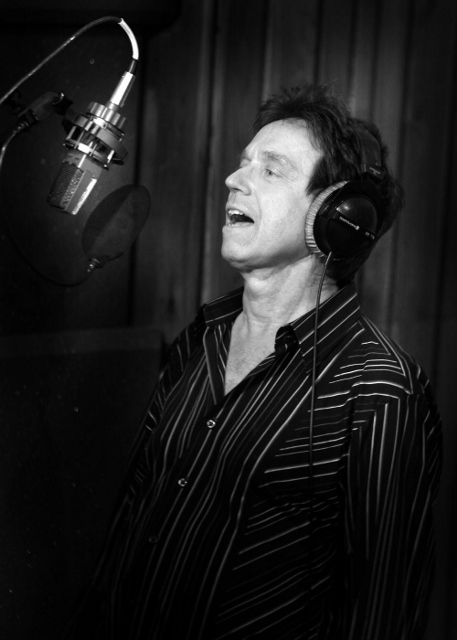 singing Peter Gabriel stuff. He’d found a video of me singing “Carpet Crawler.” It was shot and posted by the mother of a kid from the School of Rock. You can barely hear me, like I’m singing it in the background. You mostly hear glasses clinking and people talking. But he was able to dig through that tape and hear enough. He said, “I heard this voice, called Dave DeMarco and said ‘what about Stanley Whitaker’?” Dave said “I just called and talked to Stanley. He is your guy. If you want someone who can sound like Peter Gabriel, go no further.”
singing Peter Gabriel stuff. He’d found a video of me singing “Carpet Crawler.” It was shot and posted by the mother of a kid from the School of Rock. You can barely hear me, like I’m singing it in the background. You mostly hear glasses clinking and people talking. But he was able to dig through that tape and hear enough. He said, “I heard this voice, called Dave DeMarco and said ‘what about Stanley Whitaker’?” Dave said “I just called and talked to Stanley. He is your guy. If you want someone who can sound like Peter Gabriel, go no further.”
He sent me a CD of the music and copies of all the lyrics. A couple in particular that stood out from the eight tunes; “If” and “Childhood Books,” were the two that struck a chord with me. The rest, I felt I’d have to really work on to make them my own, because they just weren’t, as Michael likes to say, quite as adventurous as the music I was used to. I had also never been hired just to sing on anyone’s record. Usually, if someone calls me to play on their record, it’s to play guitar. I was flattered and challenged by the concept. “Wow! This guy wants me to sing and do all the vocals myself. That’s pretty cool.” So it was, and it was also a good time, because we were still paying off some cancer bills; he took pretty good care of me on that front.
It was lucrative in a lot of ways, but I had trouble with some of his melody ideas. He had sent a very pedestrian version of what he imagined for a lot of the melodies. I called him back and said, “If I have a lot more leeway on these melody ideas, then I’ll do it. But if you really want me to sing every single thing just like you’re playing it on here, I’m not your guy, because it is just too stiff. It’s too ‘dah, dah, dah, dah.’ There are no breaks; there’s no flow like a regular singer would have.” And he said, “Oh, no, no. Those are just little guidelines. I want you to make it your own, because, you know, do what you do with it.” That made me want to do it—having that freedom to phrase stuff and move it the way I want it. That, and doing all the vocals—coming up with all the harmony parts myself—was a nice, intriguing challenge, and I had a lot of fun doing it.
I was able to do it in my studio up on the top floor here. I have a closet I set up as a vocal booth. At that point in time, I didn’t have computer stuff. I just had an old Roland digital 1680 I’d had for 15 years that I did all my recording on. I would literally be running into the main room, hitting “record,” running into the little vocal booth as quick as I could, slamming on the head phones and hope that I had given myself enough time to get to the vocal line. That’s how I did the whole record. As I dug into it, I had more and more fun with it because Michael’s a really good storyteller. I attribute that to his Russian background. I loved the lyrics on almost all the stuff and felt I could get behind it and put some personality to it. I liked his eagerness, and his enthusiasm was charming.
ATI: The CD is amazing. So now, you’re working on your music with LeeAnne, you have another Oblivion Sun album coming out and the Six Elements CD, Primary Elements, is finding its way in the Prog world. Anything else going on for you?
STAN: I think the “Mother Nurture Fairy Tales” is going to be a little gold mine for us. We’re both very excited about that. We’re taking this year off from the bar-and-nightclub gigs so I can have a stress-free year to do other projects we want to do. Over the past few months, I’ve acquired a lot of music software I’ve never had the opportunity to dive into—part of my dream is to score films, TV and video games, which brings back my love of full-orchestra, symphonic music.
Right now, I’m inundating myself with about 30 books and manuals on everything from mixing and mastering to Q-base to orchestration and just learning all of the tools that I’ve amassed over the past six months. My mother, God rest her, passed away back in June, four days away from turning 90 years old, and my father had passed three years ago at 88. As a full Colonel in the Army, the man had made some pretty shrewd investments in his life and darn if, in death, he wasn’t able to take pretty good care of me and my brother Ken. We’ve both been able to get out of debt, pay off a lot of bills and get some tools that we had desperately needed. My only regret is that he didn’t help us out while he was still alive to be able to share that gift with us. He was from a different generation, ‘them’ folks from the depression era. We didn’t have a clue that he had put all this away, so we were both happily surprised to find out that we were able to pay off all of our debts and be pretty comfortable for a little while.
ATI: Finally, referring to you, is the man happy?
STAN: The man is very happy. I can say I am probably happier at this stage of my life than I can ever remember. My wife and I have a wonderful place to live. We are way out in the country. We rent, but we’ve been here 6 or 7 years; it’s a glorious piece of property with old willow trees and old oak trees and its own little pond. This is where we got married. It’s so lovely out here, and we both feel very fortunate to have this gift of time and to be able to take some time off and work on the things we love and be with the ones we love and be producing music and projects that we love. So life is a gift.

Wonderful, insightful interview with a great guy, Stan. Met him at NEARfest with HTM and OS and he walks the talk-no ego, friendly with all fans. Very happy for him and his wife.
So glad you liked it! We devoted the issue to Stan because he IS a great guy!
Thanks so much for the rest of the story!! Those of us who knew and loved Happy the Man in Harrisonburg in the 70s remember a time of brilliant creativity in theater, dance, arts and music.
Happy the Man fed us all with music that woke up the soul with delight. Hope Fred Brown has faired as well with his cancer as Stan. I send my love!
Hi, Linda! We knew Happy The Man’s fans would love to know what’s happened since then! We’re happy to say he’s doing well! Unfortunately, Fred Brown passed away from esophageal cancer a few years ago.
Great inteview with a really special person and a really excellent musician. BTW, that kids show was probably Fireball XL5, certainly one of my childhood favorites, also.
All the best to you both, Stan and LeeAnne.
Thanks, Jeff! We hope you read all the other interviews, too!
Much gratitude to all involved the commitment/ conversation to the story; Stanley E. Whitaker.
Best to you and yours, LeeAnne Whitaker- Moon Out Loud
Wonderful interview. Stan has an incredible attitude of gratitude! I bumped into Happy the Man by chance back in the Harrisonburg “era”. Fortunate to see them twice on campus supporting the first and second album. They remain my favorite band to this day. Prayers that Stan remains healthy for a full life of experiences.